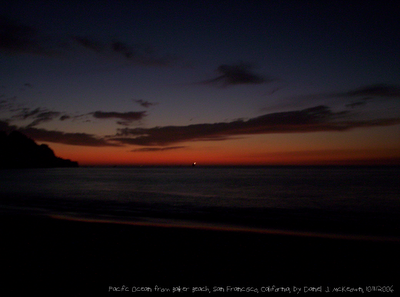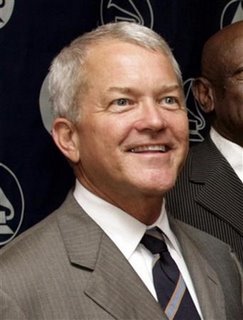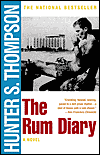 I arrived at San Francisco’s Baker Beach a bit after sunset, and I got some pictures of a beautiful dusk.
I arrived at San Francisco’s Baker Beach a bit after sunset, and I got some pictures of a beautiful dusk.
Category: Uncategorized
Email from San Francisco: Deterred
North Korea tested a nuclear device, they claim, and now the world's
leaders and diplomats are basting in self-righteous rage. Once again
the shadow of the Iraq War is cast–Saddam didn't have any atomic
weapons (many knew that) so he was a plausible target. Now the two
countries named by George W. Bush as co-captains in the "Axis of
Evil," rather than learning the sort of lesson that Bush and Cheney
demanded they learn after watching Bush's "crusade," have decided to
arm themselves to the teeth with doomsday weapons (and many expected
that).
Mocking the Nuclear-non-proliferation treaty the way Bush did in his
dealings with India, refusing to join the International Criminal Court
or the Kyoto Accords, violating and trying to re-write the Geneva
Conventions, these are not helpful gestures to the international
community.
Bush made his bet on the intimidation and fear he expected from the
rest of the world after a brutal and unnecessary occupation of Iraq.
Having declared the United Nations "irrelevant" for not
rubber-stamping his war-mongering and corruption, his alternative
plans for a "uni-polar" world are collapsing by the day.
But what of deterrence? The United States has the military power to
defend its homeland, but these strained soldiers and resources need to
be redeployed away from Iraq. As for attacking the rest of the world,
America is now the one finding itself deterred.
Blue bird in flight
"Billions" of planets in the galaxy, says astronomer
From the New York Times:
“In the quest for other worlds beyond the solar system, astronomers keep turning up planetary systems with curiouser and curiouser traits. Yesterday, astronomers who use the Hubble Space Telescope announced that they had done it again, this time locating the fastest moving and most distant ever found.
Among a batch of new planets found by training the Hubble telescope on a small patch of sky far across the galaxy in Sagittarius are as many as five that orbit their home stars in less than a day.
[…]
As potential planets are found in increasing numbers, Dr. Boss said, the odds increase that planets and planetary systems like Earth’s would be found.
Mario Livio, an astronomer at the Space Telescope Science Institute and a member of Dr. Sahu’s team, said, “There are literally billions of planets in our galaxy.””
Is the writ of habeas corpus in peril after passage of ‘Military Commissions Act of 2006′?
Why did a majority in both houses of Congress, mostly Republicans, choose to endorse George W. Bush’s mis-treatment of detainees and apparent claims of extra-judicial ability to imprison American citizens without trial with designation of “enemy combatant” status by passing the ‘Military Commissions Act’?
Justin Raimondo of antiwar.com writes:
“There has been a great deal of discussion about the Military Commissions Act of 2006 [(.pdf via balkin.blogspot.com)], recently passed by both houses of Congress, and most of it has to do with the provisions allowing torture of alien detainees, that is, of non-citizens apprehended in, say, Afghanistan or Iraq, and their treatment at the hands of their American captors. Senators John McCain, Lindsey Graham, and John Warner, all Republicans, grandstanded for weeks over the torture provisions, then capitulated. Another “Republican maverick,” Arlen Specter, zeroed in on the real issue, however, when he said the bill would set us back 800 years by repealing the habeas corpus protections against arbitrary arrest and jailings – and then went ahead and voted for it, anyway.”
"A new piousness, the snobbery of the saints"
Leon Wieseltier lands some heavy blows on the media-promoted philanthropy of the era, including Bill Clinton and his “global initiative”:
“Will the rich save the world? This has not been their traditional service to humankind; but in contemporary America you may be forgiven for believing in the messianic power of personal wealth. We are still enjoying the economicist fantasy that was inaugurated by technology in the Clinton years and consolidated by ideology in the Bush years. Could it be that the rich did not previously save the world because they were not rich enough? But they are rich enough now, right? I do not mean to be too clever. Bill Gates’s transformation of the greatest fortune in history into the greatest philanthropy in history will earn him a pride of place not only in the annals of American technology but also in the annals of American morality. No, it is the Clinton Global Initiative that makes me weary of the veneration of plutocrats. I have been reading the transcripts of the event. They are peculiarly repellent, the nobility of their purpose notwithstanding.
[…]
The CGI was not only McKinsey moralized, it was also Hilton Head globalized. The former president warmly remembered that when he had trouble finding enough progressive lightbulbs for his house, he called the CEO of General Electric. The Clintons prefer the company of winners, even if they assemble the winners to talk about the losers. And to the old exclusiveness of these egalitarians there was added a new piousness, the snobbery of the saints. The best people turn out to be the best people. The Clintons have never recognized any difference between good people and people who help them. Even Rupert Murdoch is now a good man.”
Hunter S. Thompson’s take on island living
(Book review: The Rum Diary by Hunter S. Thompson, 1998, ISBN-13: 978-0-684-85647-6)
Though Hunter S. Thompson went on to become known as the “Doctor of Gonzo Journalism” as his career went on, he had aspired to be a novelist in the high American style of F. Scott Fitzgerald and Henry Miller. While in Puerto Rico in the late 1950s and for years afterward (culminating in publication in 1998, seven years before the he died) Thompson worked on a novel that he sold the rights to in the 1960s in one of the contracts and deals that went with being a freelance writer. For various reasons it was never published (except in excerpts), and with whatever edits happened over the years (in a letter talking about the Rum Diary he pointed out that he might change the story from a perspective of greater maturity) the novel still comes pretty directly from the aspiring journalist who had come down to Puerto Rico for some sun after a year as a copyboy for Time magazine in New York fresh from a tour in the Air Force.
The Thompson of the novel (the protagonist, Paul Kemp) is an old-school American young man trying to make it in the postwar boom. Editing a newspaper story about why Puerto Ricans are leaving for New York, Kemp imagines a reporter asking him why he left home:
“I get the fear…can you use that? St. Louis Gives Young Men the Fear–not a bad healine, eh? [p.60]”
The story centers on the time Kemp is employed at an English-language newspaper in San Juan. He associates with other exiles and experiences the dramatic ups and downs of island living. As he notes in the first chapter:
“There was no reason to feel pressure, but I felt it anyway—the pressure of hot air and passing time, an idle tension that builds up in places where men sweat twenty-four hours a day. [p.23]”
Kemp is a few years older than Thompson was while in Puerto Rico, and the question arises about how much the character Yeamon (who is from Kentucky, after all) is also based on the author himself:
“He [Yeamon] looked up. ‘You know—I’m a rebel, I took off—now where’s my reward?’
‘You fool,’ I [Kemp] said. ‘There is no reward and there never was.’
‘Jesus,’ he said. ‘That’s horrible.’ He raised the bottle to his lips and finished it off. ‘We’re just drunkards,’ he said, ‘helpless drunkards…’[p.109]”
Yeamon has a girlfriend named Chenault that accompanies the two of them to a wild holiday in St. Thomas. At a house party they end up at, they lose track of her and end up confronting a hostile after-party situation and are beaten up and driven away.
They can’t even find her the next day, but then Chenault later returns to San Juan, but to Kemp’s place and not Yeamon’s, before leaving to go back to Connecticut.
Working on a tourist brochure to make extra money, Kemp meets an ex-Marine named Martin who has gone native in a way he probably never could:
“‘Yeah, I grew up in Norfolk, but I don’t remember it much—seems too long ago.’ [p.130]’”
Zimburger, a friend of Martin, reflects on how langosta don’t even have claws the way lobsters do:
“‘Old God sure was in a good mood when he made this place.’ [p.131]”
However, when Kemp runs into bland American tourists he can’t control his contempt:
“These people should be kept at home, I thought; lock them in the basement of some goddamn Elks Club and keep them pacified with erotic movies; if they want a vacation, show them a foreign art film; and if they still aren’t satisfied, send them into the wilderness and run them with vicious dogs. [p.96]”
Skepticism about being down there haunts Kemp, whether he is thinking about Europe or Mexico or questioning what his colleague Sanderson made of the island:
“He got very excited when he talked about all things happening in Puerto Rico, but I was never sure how much of his talk he believed. [p.49]”
Some of the things happening there for Kemp include a beating by cops after he and Yeamon and their friend Sala fled a dispute over being able to get dinner at a bar, and then being lucky to be bailed out of the filthy, threatening prison.
Without having resolved the resisting arrest charges incurred in the incident they were arrested for, the already-fired Yeamon plunges further into trouble after the paper collapses by participating in a deadly attack on the paper’s former owner, Lotterman:
“I saw Lotterman’s face collapse with surprise, and he was standing straight as a wooden pole when Yeamon hit him in the eyes and knocked him about six feet. He staggered wildly for a moment, then collapsed on the grass, bleeding from his eyes and both ears. Then, out of the corner of my eye, I saw a dark shape come hurtling across the garden and strike the group like a cannonball. They all went down, but Donovan was first on his feet. He had a berserk grin on his face as he grabbed one man by the head and mashed him sideways against a tree. Yeamon dragged Lotterman out from under another man and began whacking him around the garden like a punching bag. [p.198]”
Kemp ends the novel soon after, safe in the knowledge that of flight “on the morning plane.” Reflecting to music on the patio of Al’s, Kemp reflects as the novel closes with Thompson’s salute to Scott Fitzgerald:
“Sounds of a San Juan night, drifting across the city through layers of humid air; sounds of life and movement; people getting ready and people giving up, the sound of hope and the sound of hanging on, and behind them all, the quiet, deadly ticking of a thousand hungry clocks, the lonely sound of time passing in the long Caribbean night. [p.204]”
If it weren’t so sad, it would be funny
As one of the minority in this country that still appreciates reading, I found myself wandering aimlessly in cyberspace in search of interesting books. As it would happen, I inevitably began browsing titles that could result in an FBI file (if you take stock in the conspiracy theories). In the process I stumbled upon a site that nearly caused me to fall out of my chair. As I peered at the page in disbelief, I witnessed a rare but disturbing insight into the Conservative mind. A collection of Conservatives, who by some small miracle, managed to pick up a book that wasn’t a Bible, pretended to have an educated opinion on books that they deemed to be harmful. The actual title of this mockery of intelligent thought is “Ten Most Harmful Books of the 19th and 20th Centuries”. As I am still at a loss for words, I recommend that you see the site for yourself. Among the infamous list are some books that were milestones in social thought. Other titles qualified as those that may have been nefarious, but cannot be ignored. History, after all, has an odd way of revisiting those who forget its lessons.
I believe that the only possible response to such a warped view of history and literature is to post a counter-list. I would like some feedback as to what books balanced, well-educated people see as dangerous from this same time period (19th to 20th) century.
More disgusting antics from Republicans, this time from Mark Foley of Florida

Mark Foley has resigned in disgrace as Republican U.S. House member from the state of Florida. As the AP via New York Times reports:
“Rep. Mark Foley, R-Fla., just up and quit after his e-mails expressing undue interest in a 16-year-old male page were exposed to the nation.“
This story from crooksandliars.com should give a good indication of the kind of sick atmosphere the Republicans have created on Capitol Hill:
“ABC’s Brian Ross was the person who broke the story of Rep. Mark Foley. Tonight on ABC News, Ross gave a more indepth report, including the text of instant messages that Foley allegedly exchanged with these minors.
MaF54: What are ya wearing?
Teen: Tshirt and shorts
MaF54: Love to slip them off of ya.
Ross goes on to say that the messages ‘become much graphic – too graphic to be broadcast’ and gone on to describe internet sex. Later on Ross says that one page said his ‘entire class was warned about Foley from people involved in the program.’ Now if warnings were issued, then why was action never taken? Sounds like the leadership in Congress really needs to be asked some serious questions about this.“
Of course Republicans in Congress have seen one scandal after another, from the numerous ethics probes into now-indicted and resigned former House Majority Leader Tom DeLay to failed oversight of the corrupt administration of George W. Bush (and their frequent guest, convicted influence peddler Jack Abramoff<!–) to the disgrace and jailing of California Republican and former “top gun” Duke Cunningham and well beyond. And now current Majority Leader John Boehner is becoming enmeshed in this current Foley scandal, working to block an investigation into the matter and changing his story by the minute. Here’s what a right-wing blog parrots from Washington Post stories about Boehner’s shifting version of the truth:
“Washington Post: House Majority Leader John Boehner (R-Ohio) told The Washington Post last night that he had learned this spring of some “contact” between Foley and a 16-year-old page. Boehner said he told House Speaker J. Dennis Hastert (R-Ill.), and that Hastert assured him ‘we’re taking care of it.’
UPDATE: I was reading a last-night version of that piece. It now says: ‘House Majority Leader John A. Boehner (R-Ohio) told The Washington Post last night that he had learned this spring of inappropriate “contact” between Foley and a 16-year-old page. Boehner said he then told House Speaker J. Dennis Hastert (R-Ill.). Boehner later contacted The Post and said he could not remember whether he talked to Hastert.’ “
In the Senate, Byron Dorgan takes on another issue that might make people think about who to vote for in the mid-term elections. What was done, he asks, after the president was warned in August 2001 that “Bin Laden [is] determined” to attack the homeland? These Republican politicans are braying, vicious idiots and these kinds of incidents give lie to the moralistic (and often anti-gay) and “tough on terror” nonsense they preach to scared, gullible hillbillies. And what a country of hillbillies America must be, that a Democratic takeover of the House in November 2006 is even in question.
[photo: Reuters]




